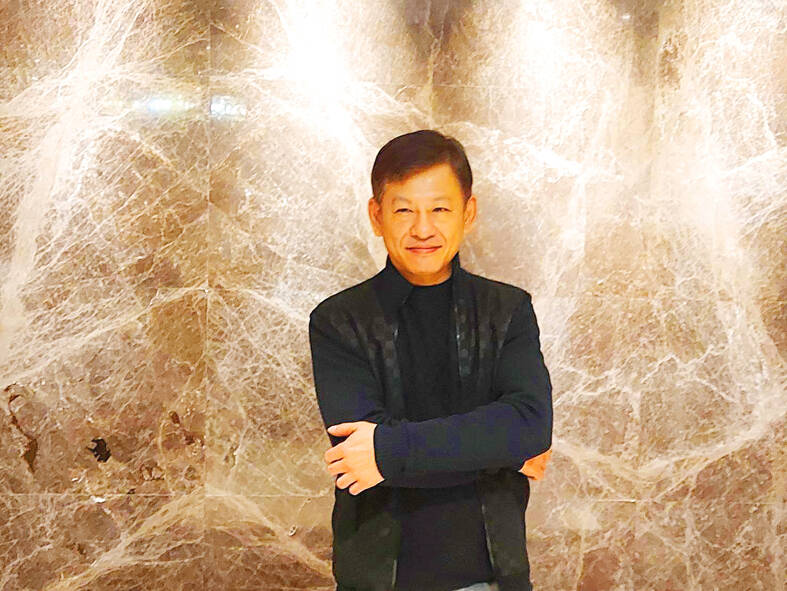Lawmakers should attach clauses that would permit loss-making transfers among joint buyers for loan arrangement reasons to an amendment to the Equalization of Land Rights Act (平均地權條例) that aims to clamp down on speculative buying in the property market, Shin Ruenn Construction Co (新潤機構) chairman Ben Huang (黃文辰) said yesterday.
Huang, who is also vice chairman of the New Taipei City Real Estate Development Association, told a news conference that it is odd that the amendment would subject property purchases by legal entities to prior approval, as it would contravene free market principles.
The bans could dampen buying interest and stretch transaction periods, but are unlikely to trigger substantial price corrections given spikes in land, building materials and labor costs, Huang said.

Photo: Chen Yung-chi, Taipei Times
“Shin Ruenn would stand by its construction schedule despite economic uncertainty and unfavorable legislation,” he said.
Developers and builders would defend the 20 percent profit margin if 25 percent gains turn out to be unfeasible, Huang said.
Developers would price their projects more reasonably, rather than engage in price concessions to facilitate deals, he said.
A flat market is also favorable for developers that seek to build land stock, he said, adding that land prices have been unreasonably high in recent years.
The company said its affiliated Shin Ruenn Development Co (新潤興業) is to post NT$35.5 billion (US$1.16 billion) in profit over the next four years in line with a sustainable business strategy, and it expects the ongoing economic slowdown to make property prices more reasonable next year.
The Taipei-based developer is due to recognize profit from joint ventures at two pre-sale projects, Good Life of Metro Heart I and II in Taoyuan’s Luzhu District (蘆竹), Shin Ruenn Development chairman Kuo Chang-geng (郭長庚) said.
The projects near the Taoyuan International Airport MRT Line have sold out, and Shin Ruenn Development could divide a profit of NT$1.23 billion upon their completion next year, Kuo said.
The company has sold 99 percent of the Shin Ruenn double complex in New Taipei City’s Linkou District (林口) and posted a 94 percent sales rate for the Manor House in Taoyuan’s Dayuan District (大園), he said.
The developer has participated in the development of Fancy World in New Taipei City’s Tamsui District (淡水) and Sky Forest in Taipei’s Nangang District (南港).
Those projects have sales rates of more than 80 percent, which meant the company has divided NT$930 million and NT$5.22 billion for each, Kuo said.
Sales rates of more than 50 percent give developers and builders confidence to continue with construction without worrying over cash flow, profitability and other issues, Huang said.

South Korea’s equity benchmark yesterday crossed a new milestone just a month after surpassing the once-unthinkable 5,000 mark as surging global memory demand powers the country’s biggest chipmakers. The KOSPI advanced as much as 2.6 percent to a record 6,123, with Samsung Electronics Co and SK Hynix Inc each gaining more than 2 percent. With the benchmark now up 45 percent this year, South Korea’s stock market capitalization has also moved past France’s, following last month’s overtaking of Germany’s. Long overlooked by foreign funds, despite being undervalued, South Korean stocks have now emerged as clear winners in the global market. The so-called “artificial intelligence

NEW IDENTITY: Known for its software, India has expanded into hardware, with its semiconductor industry growing from US$38bn in 2023 to US$45bn to US$50bn India on Saturday inaugurated its first semiconductor assembly and test facility, a milestone in the government’s push to reduce dependence on foreign chipmakers and stake a claim in a sector dominated by China. Indian Prime Minister Narendra Modi opened US firm Micron Technology Inc’s semiconductor assembly, test and packaging unit in his home state of Gujarat, hailing the “dawn of a new era” for India’s technology ambitions. “When young Indians look back in the future, they will see this decade as the turning point in our tech future,” Modi told the event, which was broadcast on his YouTube channel. The plant would convert

‘SEISMIC SHIFT’: The researcher forecast there would be about 1.1 billion mobile shipments this year, down from 1.26 billion the prior year and erasing years of gains The global smartphone market is expected to contract 12.9 percent this year due to the unprecedented memorychip shortage, marking “a crisis like no other,” researcher International Data Corp (IDC) said. The new forecast, a dramatic revision down from earlier estimates, gives the latest accounting of the ongoing memory crunch that is affecting every corner of the electronics industry. The demand for advanced memory to power artificial intelligence (AI) tasks has drained global supply until well into next year and jeopardizes the business model of many smartphone makers. IDC forecast about 1.1 billion mobile shipments this year, down from 1.26 billion the prior

People stand in a Pokemon store in Tokyo on Thursday. One of the world highest-grossing franchises is celebrated its 30th anniversary yesterday.